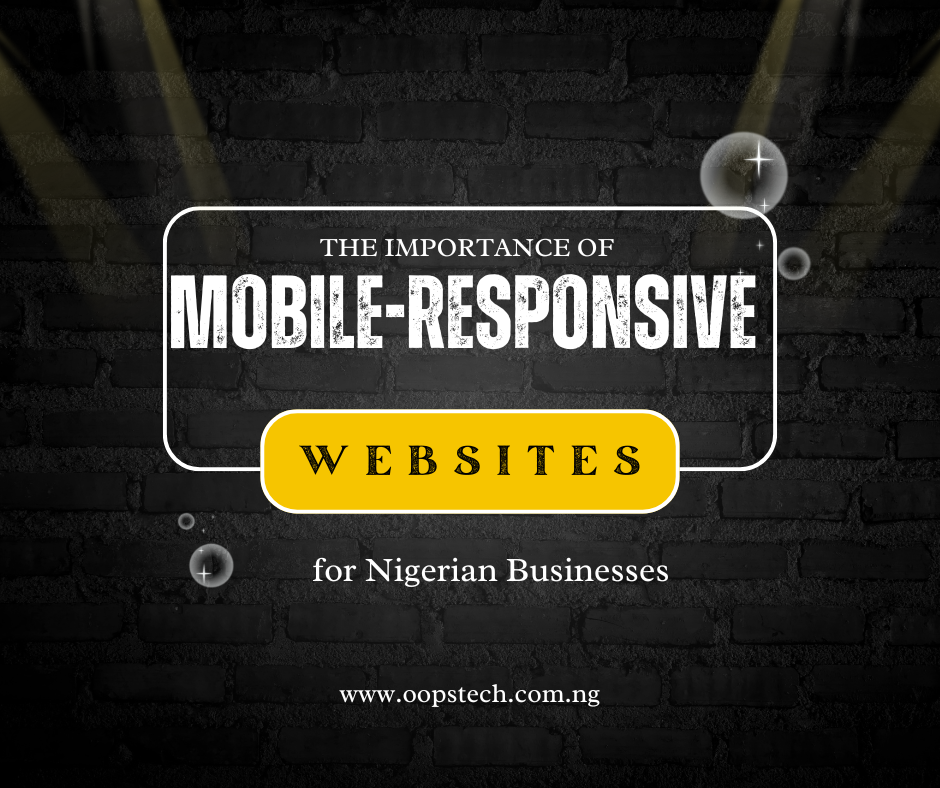Written By Sanni Philips
In today's digital landscape, Nigerian businesses must adapt to the growing reliance on mobile devices. With smartphone penetration in Nigeria reaching over 60% in 2025 and mobile internet usage continuing to surge, a mobile-responsive website is no longer optional—it's essential. This blog post explores how mobile-responsive websites help Nigerian businesses attract mobile users, boost engagement, and enhance search engine optimization (SEO).
Attracting Mobile Users
Nigeria has seen a dramatic rise in mobile internet access, with millions using smartphones to browse, shop, and connect. A mobile-responsive website automatically adjusts its layout, images, and content to fit any screen size—whether on a smartphone, tablet, or desktop. For Nigerian businesses, this means:
- Wider Reach: A seamless experience ensures users in urban centers like Lagos or rural areas in Kano can access your site effortlessly.
- Customer Trust: A site that works well on mobile signals professionalism, encouraging potential customers to explore products or services.
- Market Growth: With e-commerce and online services booming in Nigeria, a responsive design captures the growing mobile-first audience.
Without mobile responsiveness, businesses risk losing customers to competitors with user-friendly, accessible sites.
Increasing Engagement
Engagement is critical for converting visitors into loyal customers. Mobile-responsive websites enhance user experience, keeping Nigerian consumers on your site longer. Key benefits include:
- Faster Load Times: Responsive designs optimize images and content, reducing load times—a crucial factor given Nigeria's varying network speeds (e.g., 4G in cities, 3G or slower elsewhere).
- Easy Navigation: Intuitive menus and touch-friendly buttons make it simple for users to browse, inquire, or purchase, increasing time spent on your site.
- Higher Conversions: A smooth experience on mobile devices encourages actions like filling out forms, booking services, or buying products—vital for businesses like restaurants, retail, or tech startups in Nigeria.
For example, a Lagos-based fashion retailer with a responsive site can keep mobile shoppers engaged, driving more sales than a clunky, desktop-only design.
Improving SEO
Search engine optimization is a game-changer for visibility, and mobile responsiveness is a key ranking factor. Here’s how it benefits Nigerian businesses:
- Google’s Mobile-First Indexing: Google prioritizes mobile-friendly sites in its rankings. A responsive design ensures your business ranks higher, reaching more customers searching for "Nigerian tailors" or "Abuja food delivery."
- Lower Bounce Rates: If a site isn’t mobile-friendly, users leave quickly, hurting your SEO. Responsive design keeps visitors engaged, signaling quality to search engines.
- Local Advantage: With more Nigerians searching locally on mobile devices, a responsive site optimized with keywords like "buy phones in Ibadan" boosts visibility in local search results.
In a competitive market, a mobile-responsive site helps Nigerian businesses stand out on Google, driving organic traffic and growth.
For Nigerian businesses, a mobile-responsive website is a powerful tool to attract mobile users, increase engagement, and improve SEO. As smartphone usage grows and internet access expands, adapting to mobile needs is critical to staying competitive. Whether you’re a small business in Port Harcourt or a startup in Abuja, investing in a responsive design ensures you connect with customers, build loyalty, and rank higher in search results. Embrace mobile responsiveness today to unlock your business’s full potential in Nigeria’s digital economy!




